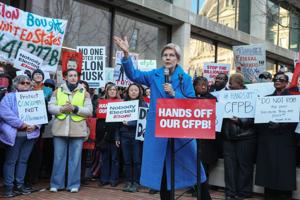The future of the Consumer Financial Protection Bureau (CFPB) hangs in the balance following significant leadership changes and budget cuts. Established by the Dodd-Frank Act in 2010, the CFPB was intended to enhance consumer protections in financial markets, particularly after the 2008 economic crisis. Recent developments, however, have raised concerns about the agency’s ability to fulfill its mission.
On February 7, 2023, Elon Musk tweeted “CFPB RIP,” reflecting the sentiment of many critics regarding the agency’s future. This followed the firing of Rohit Chopra, the CFPB’s former director, on February 1. Two days later, acting director Scott Bessent, who also serves as Treasury Secretary, directed CFPB staff to halt all rule-making and enforcement activities. Shortly after, Russell Vought, the newly appointed head of the Office of Management and Budget, took over the agency. Vought is a co-author of Project 2025, a conservative agenda that advocates for the agency’s dissolution.
Senator Elizabeth Warren, a key figure in the CFPB’s creation, has emphasized the bureau’s role in ensuring fair and competitive markets for consumers. Since its inception, the CFPB has returned over $21 billion to more than 200 million consumers harmed by financial service companies. Despite these achievements, the agency has faced persistent accusations of overreach, particularly during Chopra’s leadership under President Joe Biden.
In a letter from the Senate Committee on Banking, Housing, and Urban Affairs, members criticized the CFPB as “a lawless and unaccountable agency” pursuing a “radical agenda.” The Project 2025 plan characterized the CFPB as a tool for providing unaccountable funding to politically aligned organizations, intensifying the push for its elimination.
As the political landscape shifts, the CFPB’s immediate future appears uncertain. Amanda Jackson, director of consumer campaigns for Americans for Financial Reform, described the current moment as critical for the agency. She stated, “The CFPB has done tremendous work since its inception,” but noted a troubling retreat from prior commitments.
In early 2023, the CFPB issued layoff notices to over 1,400 staff members, threatening to reduce its workforce to about 200. This drastic measure was temporarily halted by a U.S. District Court judge, but the Trump administration quickly appealed the ruling. Meanwhile, the U.S. Supreme Court rejected a challenge to the CFPB’s funding mechanism, which had been designed to protect it from political pressures during annual budget cycles.
In July 2023, Congress reduced the CFPB’s funding cap from 12% to 6.5% of the Federal Reserve’s operating expenses, a cut that could severely limit the agency’s effectiveness. Critics argue that this budget reduction will hinder the CFPB’s ability to protect consumers, particularly against large financial institutions. Chuck Bell, advocacy program director at Consumer Reports, emphasized the detrimental impact on consumer protection, asserting that “slashing the CFPB’s budget nearly in half will severely compromise its ability to stand up for consumers.”
Compounding the agency’s challenges, House Republicans have proposed legislation to restrict the CFPB’s functions and limit aspects of the Dodd-Frank Act. While a coalition of 68 civic and community organizations, including Americans for Financial Reform, mobilized against these bills, they ultimately did not advance before the House summer recess.
Despite these setbacks, the CFPB continues to receive consumer complaints. In 2023 alone, the bureau has logged over 2.8 million complaints, with staff reportedly still engaged in monitoring and responding to these issues. Jackson noted that the complaint database remains active and vital for consumers seeking redress.
However, under Vought’s leadership, the CFPB has dismissed numerous lawsuits against financial services companies. These cases, including actions against major players like Zelle and Capital One, have been dismissed “with prejudice,” preventing future legal action on the same claims. Recently, the CFPB withdrew from a $95 million settlement with Navy Federal Credit Union concerning overdraft fees, despite previous commitments to prioritize enforcement against financial predation.
The CFPB remains without a permanent director, as Trump’s nomination of attorney Jonathan McKernan was withdrawn just days later. As it stands, Vought continues to lead the agency in an acting capacity.
Consumer advocates express concern that as federal oversight diminishes, vulnerable communities will bear the brunt of the CFPB’s reduced effectiveness. Jackson highlighted that the erosion of the CFPB’s role will particularly impact communities of color and military personnel, stating, “This attack on the bureau is an attack on those people.”
With the CFPB’s future uncertain, advocates hope that state-level initiatives can help fill the gaps left by federal oversight. As the agency navigates these challenges, its ability to serve consumers and uphold financial regulations remains a pressing concern.





































































